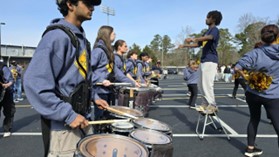NCAA Council to pass transfer ruling
NCAA Council to pass transfer ruling allowing athletes immediate eligibility
Starting next season, major college football and basketball players will be permitted to transfer one time before graduating without being required to sit out a year of competition. The NCAA Division I Council voted Wednesday to change the long-standing rule that has often deterred players in high-profile sports from switching schools.
Jeff Bazinet, a club soccer coach who is in the process of putting his players in college soccer and one of his best players into a professional league, is very in favor of this policy change. Even though this new rule would not affect professional soccer, Bazinet states that this is the step in the right direction to create a more competitive game. He also states, “It allows players who have sufficient athletic qualities to move right on, without spending a year risking injury or something else that could possibly hinder their pro career.”
Bazinet claims that he doesn’t think this policy would affect the NFL draft ‘too much’ due to the skill differential between a freshman in college versus a junior or senior. “But if there is a freshman who has the physical maturity as well as the mental maturity to play pro, then that player deserves a top ten draft position.”
The so-called one-time exception that has been available to athletes in most college sports for years will now also be available to football, men’s and women’s basketball, men’s ice hockey, and baseball players who transfer from one Division I school to another. The NCAA’s new transfer rules will require players in fall and winter sports to notify their current schools they intend to leave by May 1; spring sport athletes must do so by July 1, starting in 2022. Administrators who have the final say on NCAA rules are in no rush to make changes.
The rule is expected to have a major impact on college football and ushering in what some have referred to as “free agency” in the sport. Though transferring is already prevalent in college football, it is expected to become even more common among athletes seeking more playing time without the hassle of missing a full season.

Madeline loves playing soccer for Wheeler and Club and working out! After high school, she hopes to major in communications and work in PR or any media-based...



